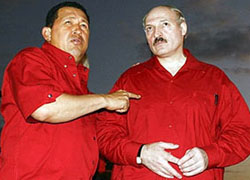Former Mexican Prime Minister: “Chavez makes huge weapons purchases in Belarus”
16- 23.11.2009, 10:16

Jorge Castañeda states that Venezuelan president gets ready for a war; he has started to buy tanks and fighter aircrafts from Belarus and Russia, and even one submarine.
An article by Jorge Castañeda, former Mexican prime minister (2000-2003), is at the moment internationally acclaimed professor of political science and Latin America studies in the University of New York, “Time for conflict with Chavez has come apparently”, was published by Russian “Novaya Gazeta”.
As the former Mexico's prime minister writes, in early September major enterprises of Colombia amazed everyone stating their whole-hearted support of the country’s president Álvaro Uribe in his exacerbating conflict with Venezuela. According to him, it is possible that hesitation of business community of Colombia that hadn’t wanted to come to conflict with Hugo Chavez, was the last obstacle for Uribe, the US and numerous democratic countries of Latin America in their way of confrontation with Chavez. Now this obstacle doesn’t exist.
As Castañeda writes, “Venezuelan colonel” Chavez constantly offered refuge, weapons, diplomatic assistance and financing to the FARC (the Revolutionary Armed Forces of Colombia), the organisation which aims to overturn Colombian government. He makes huge weapons purchases in Russia, Ukraine and Belarus, in particular, recently he started buying tanks, fighter aircrafts and even one submarine. He constantly cracks down on dissenters, opposition and basic freedoms in Venezuela, and also confiscate commercial enterprises without any compensation.
Systematically supporting his allies in other countries of Latin America, from Bolivia and Argentina to Honduras and Salvador, as well as opposition in Peru, Nicaragua, Ecuador and Mexico, Chavez has polarized the entire Latin American continent, as well as the society of his own country. Besides, he plunged Venezuela into global conflicts on the other side of the planet, becoming an ally of the Iranian regime and one of its reliable supporters.
Despite of all these facts, nobody tried to stop Chavez still, prime Minister of Mexico writes. Moreover, Álvaro Uribe still seems to seek compromises. Beside defence of interests of Colombian business, he is trying to make amendments in the Constitution of Colombia, in order to have a possibility to rule the third term, as Chavez in Venezuela had done, and as his allies in Bolivia, Ecuador, Argentine and Nicaragua tried to do.
Uribe still can retreat, though he, though he leaves a considerable place for manoeuvre for himself, and he can deny to participate in the next election, despite of all the things his adherents have done. But he also seeks help from the US, which can ultimately pacify Chavez.
Barack Obama, the US president, cannot criticise Chavez’ eternal presidency, without an effect on Uribe, and it seems to Obama that it is virtually impossible to revive “Plan Colombia” in the Congress (a program of fighting drugs and rebels started in 1999 by Bill Clinton), and moreover, to rubberstamp agreement on free trade between Colombia and the US if US critics would portray Uribe as constant violator of human rights, who wants to stay in power forever.
The case against Chavez would be convincing if he would be presented in a due way, referring to a series of constant violations of internal, regional and international commitments, and agreements signed and ratifies by Venezuela. All these violations can be confirmed and imputed upon Chavez: liquidation of TV channels, imprisonments and eviction of opponents from the country, providing weapons to rebels from neighbouring countries, provoking arms race in the region and flirting with Iranian uranium enrichment program.
If Colombia and Obama would act this way, their potential allies in the rest of the hemisphere would forget their fears about grim future. To allow the situation to be adrift towards exacerbation of confrontation is not a rational policy for Colombia, the US and Latin American countries in general. Such a policy would allow Venezuela choosing a new conflict, putting off open confrontation until the time when situation’s aggravation would make the conflict inevitable and more dangerous. The time has come for Obama to follow the example of the business community of Colombia and stop , Jorge Castañeda concluded.










